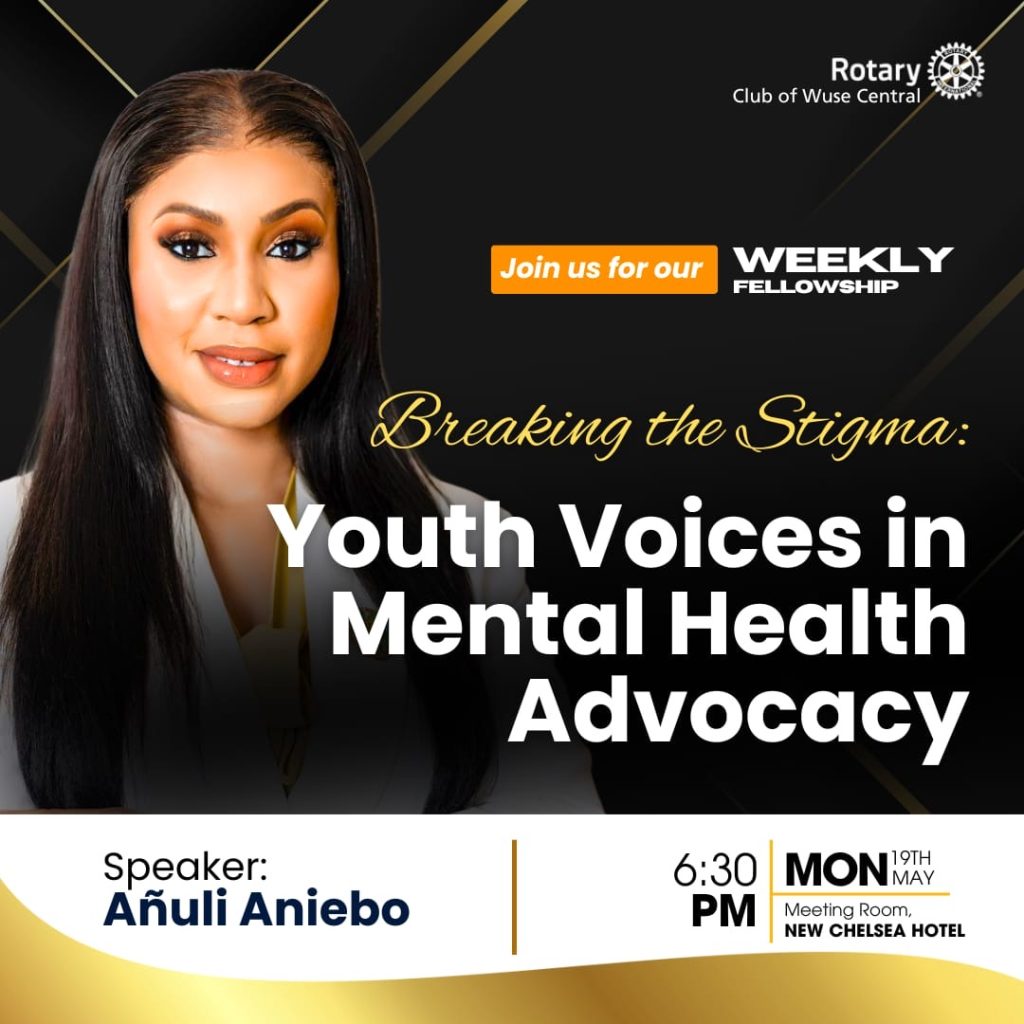
I was invited by the Rotary Club, Abuja, to lecture on galvanising youth voices in breaking the normalised stereotypes about Mental health. The month is dedicated to Mental Health Awareness, with conversations and discussions trending on this subject matter. While there are more spaces emphasising on the need to center mental health and wellness, there is still an education and culture gap to interrogate and fill.
Conceptualising the Term
The World Health Organisation (WHO) defines Mental health as a state of mental well-being that enables people to cope with the stresses of life, realize their abilities, learn well and work well, and contribute to their community. It has intrinsic and instrumental value and is integral to our well-being.
Historizing Mental Health attributed this ideology to supernatural causes and in some cases, a disorder in behaviour that was “abnormal”. The treatment of mental health disorders was harsh, laced with exclusion and stigmatisation. In the 1900s, a group of Doctors were concerned about this treatments and decided to demystify the ideology and transform the inhumane interventions of people with this condition to a more dignifying and less harmful methods of therapy.
In the Nigerian environment, according to the Borgen Project and MANI, as at 2019, wiith a population of 181 million (at the time), it was estimated that as much as 30 percent of the population suffers from a mental illness. This means that more than 54 million people are dealing with mental illness with little to no help, with the most common mental health challenge to be depression. In intervening with the solution, Nigeria has an update to the laws regarding mental health in Nigeria, with the first law on mental health being refined from 1958. .Nigeria has now embarked on a major change in the mental health services and on Jan 5, 2023, the Nigerian President signed the Mental Health Bill 2021 into law, replacing the outdated 65-year-old Lunacy Act. Although this law reflects the political will in Nigeria regarding the need to improve mental health care, the aim of Nigeria’s National Mental Health Act 2021 can only be achieved through effective implementation. Nigerian government still needs to commit to spend more than 4 percent of its annual budget on healthcare to alogn her health systems to cater to the increasing needs of the population.
Mental Health through the lens of Gender
Gender roles and expectations can significantly impact mental health and trigger issues aroud emotional well-being. Society has stereotyped men and women to become “responsible” for certain expectations and are often times, measured by such. Expectations that men should be strong, assertive, and the primary breadwinners, while women are directly or tacitly prompted to be nurturing, caring, and focused on domestic responsibilities are some of the gender culture and norms society measures by. An alternate reality away from such norms can trigger non-conforming behaviours which are often times shamed, silenced and discriminated at. The pressure from suppressing emotions from women and men can cause internal conflict, increased stress which can lead to depression or anxiety.
Adolescents and Older Adults Mental Health Antecedents
According to WHO, one in seven 10-19 year olds, experience one mental disorder or another with depression, anxiety and behavioural disorders noted as the leading causes of illness and disability among adolescents In older adults, the Global Health Estimates reports that older adults experience depression and anxiety however a larger mental health condition in older adults go unrecognised and under-treated. Suicide is the third leading cause of death in 15-29 years old with 73% of suicide deaths occurring in low to middle income countries. It is important to note that for every suicide, there many suicide attempts preceding it that are un-recorded which is caused by the intersection of factors I have highlighted in this article. .
Triggers of Mental Health
Social norms and the manner that culture addressing mental health challenges has been unhelpful in identification and understanding of mental wellness. Often times, the admittance of mental health can lead to stigmatisation and silencing of voices and bodies that need support to overcome the situation. This conceptualisation causes negativity which sometimes gets reinforced on media and places of worship.
Failing to address mental health conditions in adolescents can impair physical and emotional health as well as limit opportunities. Ageism, social isolation, loneliness, abuse (physical, verbal, psychological, sexual, financial, neglect) can lead to serious consequences that can lead to depression and anxiety.
Can your voice challenge the stigma?
Mental health awareness should aim to strengthen an individual’s capacity to regulate emotions, enhance alternatives to risk-taking behaviours, build resilience for managing difficult situations and adversity, and promote supportive social environments and social networks.
It starts in you, your family and environment of learning, your circle of influence and to the wider community. Metal health awareness requires a more deliberate and conscious intervention by us all. I call on us all to be observant, vigilant, show kindness and empathy as we all address mental wellbeing.
Añuli Aniebo
————————-
References
Betterhelp https://www.betterhelp.com/advice/stereotypes/the-impact-of-gender-roles-on-mental-health/
Mental Aware Nigeria Initiative (MANI)
Nwoha C, 2023, The Borgen Project https://www.borgenmagazine.com/mental-health-challenges-in-nigeria/
Rotary Club https://rotaryabujawuse2.org
World Health Organisation on Mental Health 2025 https://www.who.int/health-topics/mental-health#tab=tab_1
